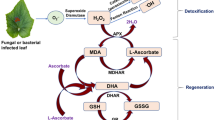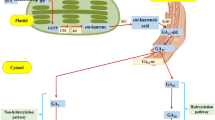Abstract
Sugarcane (Saccharum spp. hybrids) is the primary source of sugar and renewable biofuel energy worldwide. Nevertheless, sugarcane production is affected by different biotic and abiotic stresses. In this work, we analysed the impact of Puccinia melanocephala infection and salt stress on the expression profile of genes related with inositol phosphate synthesis and TOR (Target of Rapamycin) signalling pathway regulation in sugarcane. In this sense, two-month-old plants of rust resistant and susceptible cultivars were infected with P. melanocephala and leaf samples were collected daily during the first seven days post-inoculation. A second group of plants was treated with NaCl, previous to leaf sampled at 2 h and 72 h post-stress, leaf chlorophyll content was measured. Quantitative PCR was used to obtain gene expression profiles. Tctp gene was up-regulated in the rust resistant cultivar suggesting that a component of TOR signalling pathway is involving in early pathogen recognition. Biotic and abiotic stresses modified the transcript profile of Mips2 and Tap46 genes, depending on the sugarcane stress resistance. Our results contribute to a better understanding of stress signalling networks in sugarcane.





Similar content being viewed by others
Abbreviations
- ACT:
-
Actin
- DPI:
-
Days postinoculation
- HR:
-
Hypersensitive response
- MIPS:
-
Myo-inositol-1-phosphate synthase
- TAP46:
-
Protein phosphatase2A (PP2A)-associated protein
- TAP46L:
-
Protein phosphatase2A (PP2A)-associated protein (leaf)
- TCTP:
-
Translationally controlled tumour protein
- TOR:
-
Target of Rapamycin
References
Ahmad, A., Y. Niwa, S. Goto, K. Kobayashi, M. Shimizu, S. Ito, Y. Usui, T. Nakayama, and H. Kobayashi. 2015. Genome-wide screening of salt tolerant genes by activation tagging using dedifferentiated calli of Arabidopsis and its application to finding gene for Myo-inositol-1-P-synthase. PLoS ONE 10: e0115502. https://doi.org/10.1371/journal.pone.0115502.
Ahn, C.S., H.K. Ahn, and H.S. Pai. 2015. Overexpression of the PP2A regulatory subunit Tap46 leads to enhanced plant growth through stimulation of the TOR signalling pathway. Journal of Experimental Botany 66: 827–840. https://doi.org/10.1093/jxb/eru438.
Ahn, C.S., J.A. Han, H.S. Lee, S. Lee, and H.S. Pai. 2011. The PP2A regulatory subunit Tap46, a component of the TOR signaling pathway, modulates growth and metabolism in plants. Plant Cell 23: 185–209. https://doi.org/10.1105/tpc.110.074005.
Anitha, R., P. Christy, M. Nirmala, M.A. Joseph, R. Savery, N. Sritharan, and R.S. Purushothaman. 2015. Differential responses of sugarcane (Saccharum officinarum L.) genotypes under salt stress condition. Plant Archives 15: 1055–1060.
Ascencio-Ibanez, J.T., R. Sozzani, T.J. Lee, T.M. Chu, R.D. Wolfinger, R. Cella, and L. Hanley-Bowdoin. 2008. Global analysis of Arabidopsis gene expression uncovers a complex array of changes impacting pathogen response and cell cycle during geminivirus infection. Plant Physiology 148: 436–454. https://doi.org/10.1104/pp.108.121038.
Aznar, R.N., F.V. Consolo, G.L. Salerno, and G. Martínez-Noël. 2017. TOR signaling downregulation increases resistance to the cereal killer Fusarium graminearum. Plant Signaling & Behavior 13: e1414120. https://doi.org/10.1080/15592324.2017.1414120.
Berkowitz, O., R. Jost, S. Pollmann, and J. Masle. 2008. Characterization of TCTP, the translationally controlled tumor protein, from Arabidopsis thaliana. Plant Cell 20: 3430–3447. https://doi.org/10.1105/tpc.108.061010.
Bommer, U.A., and B.J. Thiele. 2004. The translationally controlled tumour protein (TCTP). The International Journal of Biochemistry & Cell Biology 36: 379–385. https://doi.org/10.1016/S1357-2725(03)00213-9.
Caldana, C., M.C.M. Martins, U. Mubeen, and R. Urrea-Castellanos. 2019. The magic ‘hammer’ of TOR: the multiple faces of a single pathway in the metabolic regulation of plant growth and development. Journal of Experimental Botany 70: 2217–2225.
Cao, B., Y. Lu, G. Chen, and J. Lei. 2010. Functional characterization of the translationally controlled tumor protein (TCTP) gene associated with growth and defense response in cabbage. Plant Cell, Tissue and Organ Culture 103: 217–226. https://doi.org/10.1007/s11240-010-9769-6.
Cha-um, S., S. Chuencharoen, C. Mongkolsiriwatana, M. Ashraf, and C. Kirdmanee. 2012. Screening sugarcane (Saccharum sp.) genotypes for salt tolerance using multivariate cluster analysis. Plant Cell, Tissue and Organ Culture 110: 22–33. https://doi.org/10.1007/s11240-012-0126-9.
Comstock, J.C., J.M. Shine, and R.N. Raid. 1992. Effect of rust on sugarcane growth and biomass. Plant Disease 76: 175–177. https://doi.org/10.1094/PD-76-0175.
Das-Chatterjee, A., L. Goswami, S. Maitra, K.G. Dastidar, S. Ray, and A.L. Majumder. 2006. Introgression of a novel salt-tolerant L-myo-inositol 1-phosphate synthase from Porteresia coarctata (Roxb.) Tateoka (PcINO1) confers salt tolerance to evolutionary diverse organisms. FEBS Letters 580: 3980–3988. https://doi.org/10.1016/j.febslet.2006.06.033.
De Vleesschauwer, D., O. Filipe, G. Hoffman, H.S. Seifi, A. Haeck, P. Canlas, J. Van Bockhaven, E. De Waele, K. Demeestere, P. Ronald, and M. Höfte. 2018. Target of rapamycin signaling orchestrates growth-defense trade-offs in plants. New Phytologist 217: 305–319. https://doi.org/10.1111/nph.14785.
Dobrenel, T., C. Caldana, J. Hanson, C. Robaglia, M. Vincentz, B. Veit, and C. Meyer. 2016. TOR signaling and nutrient sensing. Annual Review of Plant Biology 67: 261–285. https://doi.org/10.1146/annurev-arplant-043014-114648.
Dobrenel, T., C. Marchive, M. Azzopardi, G. Clement, M. Moreau, R. Sormani, C. Robaglia, and C. Meyer. 2013. Sugar metabolism and the plant target of rapamycin kinase: a sweet operaTOR? Frontiers in Plant Physiology 4: 93. https://doi.org/10.3389/fpls.2013.00093.
Ermolayev, V., W. Weschke, and R. Manteuffel. 2003. Comparison of Al-induced gene expression in sensitive and tolerant soybean cultivars. Journal of Experimental Botany 54: 2745–2756. https://doi.org/10.1093/jxb/erg302.
Fabro, G., J.A. Di Rienzo, C.A. Voigt, T. Savchenko, K. Dehesh, S. Somerville, and M.E. Alvarez. 2008. Genome-wide expression profiling Arabidopsis at the stage of Golovinomyces cichoracearum haustorium formation. Plant Physiology 146: 1421–1439. https://doi.org/10.1104/pp.107.111286.
Gomathi, R., and T.V. Thandapani. 2005. Salt stress in relation to nutrient accumulation and quality of sugarcane genotypes. Sugar Tech 7: 39–47. https://doi.org/10.1007/BF02942416.
Gupta, B., and B. Huang. 2014. Mechanism of salinity tolerance in plants: physiological, biochemical, and molecular characterization. International Journal of Genomics 2014: 18. https://doi.org/10.1155/2014/701596.
Hoepflinger, M.C., J. Reitsamer, A.M. Geretschlaeger, N. Mehlmer, and R. Tenhaken. 2013. The effect of translationally controlled tumour protein (TCTP) on programmed cell death in plants. BMC Plant Biology 13: 135. https://doi.org/10.1186/1471-2229-13-135.
Hu, R., Y. Zhu, G. Shen, and H. Zhang. 2014. TAP46 plays a positive role in the ABSCISIC ACID INSENSITIVE5-regulated gene expression in Arabidopsis. Plant Physiology 164: 721–734.
Hung, C.Y., P. Jr Aspesi, M.R. Hunter, A.W. Lomax, and I.Y. Perera. 2014. Phosphoinositide-signaling is one component of a robust plant defense response. Frontiers in Plant Science 5: 267. https://doi.org/10.3389/fpls.2014.00267.
Jones, A.M., V. Thomas, M.H. Bennett, J. Mansfield, and M. Grant. 2006. Modifications to the Arabidopsis defense proteome occur prior to significant transcriptional change in response to inoculation with Pseudomonas syringae. Plant Physiology 142: 1603–1620. https://doi.org/10.1104/pp.106.086231.
Kim, Y.M., Y.J. Han, O.J. Hwang, S.S. Lee, A.Y. Shin, S.Y. Kim, and J.I. Kim. 2012. Overexpression of Arabidopsis translationally controlled tumor protein gene AtTCTP enhances drought tolerance with rapid ABA-induced stomatal closure. Molecular Cell 33: 617–626. https://doi.org/10.1007/s10059-012-0080-8.
Li, D., Z. Deng, X. Liu, and B. Qin. 2013. Molecular cloning, expression profiles and characterization of a novel translationally controlled tumor protein in rubber tree (Hevea brasiliensis). Journal of Plant Physiology 170: 497–504. https://doi.org/10.1016/j.jplph.2012.11.014.
Li, G., X.Y. Liu, X.P. Li, and Z.Y. Wang. 2010. Cloning of a TCTP gene in wheat and its expression induced by Erysiphe graminis. Bulletin of Botanical Research 30: 441–447. https://doi.org/10.7525/j.issn.1673-5102.2010.04.011.
Liao, M., Y. Li, and Z. Wang. 2009. Identification of elicitor-responsive proteins in rice leaves by a proteomic approach. Proteomics 9: 2809–2819. https://doi.org/10.1002/pmic.200800192.
Mahfouz, M.M., K. Sunghan, A.J. Delauney, and D.P. Verma. 2006. Arabidopsis TARGET OF RAPAMYCIN interacts with RAPTOR, which regulates the activity of S6 Kinase in response to osmotic stress signals. Plant Cell 18: 477–490. https://doi.org/10.1105/tpc.105.035931.
Meng, X., Y. Yu, J. Zhao, N. Cui, T. Song, Y. Yang, and H. Fan. 2018. The two translationally controlled tumor protein genes, CsTCTP1 and CsTCTP2, are negative modulators in the Cucumis sativus defense response to Sphaerotheca fuliginea. Frontiers in Plant Science 9: 544. https://doi.org/10.3389/fpls.2018.00544.
Moreau, M., M. Azzopardi, G. Clément, T. Dobrenel, C. Marchive, C. Renne, M.L. Martin-Magniette, L. Taconnat, J.P. Renou, C. Robaglia, and C. Meyer. 2012. Mutations in the Arabidopsis homolog of LST8/Gβ L, a partner of the target of Rapamycin kinase, impair plant growth, flowering, and metabolic adaptation to long days. Plant Cell 24: 463–481. https://doi.org/10.1105/tpc.111.091306.
Murad, A.M., H.B.C. Molinari, B.S. Magalhaes, A.C. Franco, F.S.C. Takahashi, O.L. Franco, and B. Ferraz Quirino. 2014. Physiological and proteomic analyses of Saccharum spp. grown under salt stress. PLoS ONE 9 (6): e98463. https://doi.org/10.1371/journal.pone.0098463.
Murphy, A., B. Otto, C. Brearley, J. Carr, and D. Hanke. 2008. A role for inositol hexakisphosphate in the maintenance of basal resistance to plant pathogens. Plant Journal 56: 638–652. https://doi.org/10.1111/j.1365-313X.2008.03629.x.
Oloriz, M.I., V. Gil, L. Rojas, O. Portal, Y. Izquierdo, E. Jiménez, and M. Höfte. 2012. Sugarcane genes differentially expressed in response to Puccinia melanocephala infection: identification and transcript profiling. Plant Cell Reports 31: 955–969. https://doi.org/10.1007/s00299-011-1216-6.
Oloriz, M.I., V. Gil, L. Rojas, N. Veitía, M. Höfte, and E. Jiménez. 2011. Selection and characterisation of sugarcane mutants with improved resistance to brown rust obtained by induced mutation. Crop & Pasture Science 62: 1037–1044. https://doi.org/10.1071/CP11180.
Pacheco, C.M., M.C. Pestana-Calsa, F.C. Gozzo, C. Mansur, R.J. Nogueira, M. Menossi, and T. Jr. Calsa. 2011. Differentially delayed root proteome responses to salt stress in sugar cane varieties. Journal of Proteome Research 12: 5681–5695. https://doi.org/10.1021/pr400654a.
Popa, C., L. Li, S. Gil, L. Tatjer, K. Hashii, M. Tabuchi, N.S. Coll, J. Ariño, and M. Valls. 2016. The effector AWR5 from the plant pathogen Ralstonia solanacearum is an inhibitor of the TOR signalling pathway. Scientific Reports 6: 27058. https://doi.org/10.1038/srep27058.
Ren, M., P. Venglat, S. Qiu, L. Feng, Y. Cao, E. Wang, D. Xiang, J. Wang, D. Alexander, S. Chalivendra, D. Logan, A. Mattoo, G. Selvaraj, and R. Datla. 2012. Target of rapamycin signaling regulates metabolism, growth, and life span in Arabidopsis. Plant Cell 24: 4850–4874. https://doi.org/10.1105/tpc.112.107144.
Rozen, S., and H.J. Skaletsky. 2000. Primer3 on the WWW for general users and for biologist programmers. In Bioinformatics methods and protocols: methods in molecular biology, ed. S. Krawetz and S. Misener, 365–386. Totowa: Humana Press.
Toscano-Morales, R., B. Xoconostle-Cázares, A.C. Martínez-Navarro, and R. Ruiz-Medrano. 2016. AtTCTP2 mRNA and protein movement correlates with formation of adventitious roots in tobacco. Plant Signaling & Behavior 11: 3. https://doi.org/10.1080/15592324.2015.1071003.
Van Dillewijn, C. 1952. Botany of sugarcane. Waltham: The Chronica Botanica.
Wiedenfeld, B. 2008. Effects of irrigation water salinity and electrostatic water treatment for sugarcane production. Agricultural Water Management 95: 85–88. https://doi.org/10.1016/j.agwat.2007.10.004.
Yuan, J., M. Zhu, D.A. Lightfoot, M.J. Iqbal, J.Y. Yang, and K. Meksem. 2008. In silico comparison of transcript abundances during Arabidopsis thaliana and Glycine max resistance to Fusarium virguliforme. BMC Genomics 9 (Suppl 2): S6. https://doi.org/10.1186/1471-2164-9-S2-S6.
Zhu, J.K. 2002. Salt and drought stress signal transduction in plants. Annual Review of Plant Biology 53: 247–273. https://doi.org/10.1146/annurev.arplant.53.091401.143329.
Acknowledgements
The authors are grateful for the financial support of VLIR-UOS through a Short Research Stay Grant to María I. Oloriz.
Author information
Authors and Affiliations
Corresponding author
Ethics declarations
Conflict of interest
The authors declare that they have no conflict of interest.
Additional information
Publisher's Note
Springer Nature remains neutral with regard to jurisdictional claims in published maps and institutional affiliations.
Rights and permissions
About this article
Cite this article
Oloriz, M.I., Portal, O., Rojas, L. et al. Puccinia melanocephala and Salt Stress Modified the Inositol Phosphate and TOR Signalling Pathway in Sugarcane. Sugar Tech 23, 407–414 (2021). https://doi.org/10.1007/s12355-020-00894-z
Received:
Accepted:
Published:
Issue Date:
DOI: https://doi.org/10.1007/s12355-020-00894-z




